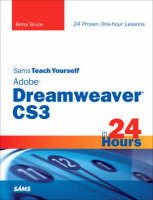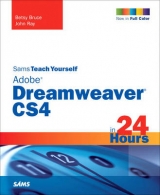
Sams Teach Yourself Adobe Dreamweaver CS3 in 24 Hours
Sams Publishing (Verlag)
978-0-672-32936-4 (ISBN)
- Titel erscheint in neuer Auflage
- Artikel merken
Betsy Bruce
24 Proven One-hour Lessons
In just 24 lessons of one hour or less, you will be able to create a fully functional website using Adobe Dreamweaver CS3. Using a straightforward, step-by-step approach, each lesson offers background knowledge along with practical steps to follow, allowing you to learn the essentials of using Dreamweaver from the ground up.
Step-by-step instructions carefully walk you through the most common Dreamweaver tasks.
Quizzes and Exercises at the end of each chapter help you test your knowledge.
By the Way notes present interesting information related to the discussion.
Did You Know? tips offer advice or show you easier ways to do something.
Watch Out! cautions alert you to possible problems, and give you advice on how to avoid them.
Learn how to…
Use Dreamweaver CS3 to create simple or advanced web pages
Create forms to collect information from users at your site
Organize your site with templates and libraries
Make Cascading Style Sheets work for you
Craft an interactive website with DHTML
Display data efficiently with tables
Dress up your site with Flash files and other multimedia
Insert scripted functionality by using Behaviors
Insert content controls using the Spry framework JavaScript libraries
Customize and extend Dreamweaver
Upload your website to a server with Dreamweaver’s built-in FTP capability
Betsy Bruce is a consultant and owner of Performance Factor, creators of training and performance support applications using Dreamweaver and Flash. She is an Adobe-certified instructor for Dreamweaver, Flash, Captivate, and Authorware. As an authorized trainer, she has traveled the country instructing groups–ranging from corporations to school districts–on effectively creating dynamic and standards-based web content.
Register your book at www.samspublishing.com/register for convenient access to downloads, updates, and corrections as they become available.
Category: Web Development
Covers: Adobe® Dreamweaver® CS3
User Level: Beginning
Betsy Bruce is a developer and consultant who specializes in creating eLearning applications using Dreamweaver, Authorware, Captivate, and Flash. She was lead developer at the Cobalt Group in Seattle, where her team won the 2003 Macromedia Innovation in eLearning award and was Manager of Technical Services at MediaPro, Inc., where her team won many awards for the projects it developed. She is an Adobe-certified trainer for Dreamweaver, Contribute, Flash, Captivate, and Authorware. Betsy received her B.S. degree from the University of Iowa and her M.A. degree in educational technology from San Diego State University. She is frequently a speaker at conferences on creating eLearning and using Dreamweaver. She is also the author of eLearning with Dreamweaver MX: Creating Online Learning Applications from New Riders Publishing. Born and raised in Iowa, Betsy lives in Seattle with her partner and two Siberian huskies. Her website is located at www.betsybruce.com.
I>Part I Getting Started with Dreamweaver
HOUR 1...... : A World Wide Web of Dreamweaver Possibilities
What Can You Do with Dreamweaver?
Defining the Technology
Dissecting Website Examples
Summary
Q&A
Workshop
Exercises
HOUR 2.................. : A Tour of Dreamweaver
Acquainting Yourself with Dreamweaver
Exploring the Dreamweaver Work Area
Getting Help
Summary
Q&A
Workshop
Exercises
HOUR 3: Setting Up a Website
Defining a New Website
Using the Site Definition Wizard
Using the Files Panel
Editing a Site Definition
Considering Site Organization
Summary
Q&A
Workshop
Exercises
HOUR 4: Dealing with Words: Adding Text and Lists
Creating a New Page
Adding Text to a Web Page
Applying Text Formatting
Setting Page Properties
Introducing Cascading Style Sheets
Changing Text Attributes in the Property Inspector
Aligning Text
Creating Lists and Indenting Text
Adding a Separator to a Page: The Horizontal Rule
Previewing in a Browser
Summary
Q&A
Workshop
Exercises
HOUR 5.... : Adding Links: Hyperlinks, Anchors, and Mailto Links
Exploring Relative and Absolute Paths
Adding a Hyperlink Within a Website
Setting Link Color Preferences
Organizing a Long Page by Using Named Anchors
Using the Point-to-File Icon
Adding a Mailto Link
Summary
Q&A
Workshop
Exercises
HOUR 6: Formatting Web Pages Using Cascading Style Sheets
Styling Text with CSS
Creating a Class Selector
Exploring Style Settings
Redefining an HTML Tag
Editing Styles
Creating an External Style Sheet
Understanding the Cascade
Summary
Q&A
Workshop
Exercises
HOUR 7: Looking Under the Hood: Exploring HTML
Exploring Code View
Viewing and Editing HTML Tags by Using the Quick Tag Editor
Setting Code Preferences
Cleaning Up HTML Created with Microsoft Word
Exploring References
Summary
Q&A
Workshop
Exercises
Part II: Adding and Managing Images and Multimedia
HOUR 8: Displaying Images
Adding an Image to a Page
Exploring Image Flavors: GIF, JPEG, and PNG
Editing Images Within Dreamweaver
Creating a Linked Image
Creating an Imagemap
Summary
Q&A
Workshop
Exercises
HOUR 9.... : Complementing Dreamweaver with Other Applications
Acquainting Yourself with Photoshop
Modifying Images for Use in a Web Page
Creating an Image
Adding a Filter to a Rollover Image
Slicing an Image into Pieces
Importing Table Data from Excel
Summary
Q&A
Workshop
Exercises
HOUR 10: Adding Flash and Other Multimedia to a Web Page
Exploring Multimedia and Bandwidth
Understanding Players
Adding Flash Files
Adding a Link to a PDF File
Adding a Sound File to a Web Page
Adding a Java Applet to a Web Page
Summary
Q&A
Workshop
Exercises
HOUR 11........ : Managing Assets Using the Assets Panel
What Are Assets?
Managing Assets in the Assets Panel
Adding Assets to a Web Page
Creating Favorite Assets
Creating New Assets in the Assets Panel
Copying Assets to Another Site
Summary
Q&A
Workshop
Exercises
Part III: Web Page Layout
HOUR 12................ : Displaying Data in Tables
Creating a Table for Data
Modifying a Table and Adding Content
Exporting Data from a Table
Nesting a Table Within a Table
Editing Existing Page Layout Tables
Summary
Q&A
Workshop
Exercises
HOUR 13: Using CSS for Positioning
Understanding the CSS Box Model
Exploring a CSS Page Layout Example
Positioning a Div
Using a Tracing Image
Creating Multiple and Contextual Selectors
Floating Page Elements
Centering Your Design on the Page
Fine-Tuning Your Design
Summary
Q&A
Workshop
Exercises
HOUR 14...... : Creating CSS for Mobile Devices and Printing
Understanding the CSS Media Attribute
Previewing Style Rendering in Dreamweaver
Adding an Alternative Style Sheet
Designing CSS for Print
Previewing Web Pages Styles for Handheld Devices
Summary
Q&A
Workshop
Exercises
HOUR 15: Creating Library Items and Templates
Managing Library Items and Templates in the Assets Panel
Creating a Library Item
Adding a Library Item to a Page
Making Changes to a Library Item
Creating a Template
Creating a Web Page from a Template
Making Changes to a Template and Updating Pages
Using CSS Styles with Library Items and Templates
Summary
Q&A
Workshop
Exercises
Part IV: Dynamic HTML and AJAX: Using AP Divs, Behaviors, and XML
HOUR 16: Adding Navigation: Navigation and Menu Bars
Understanding Navigation
Creating a Rollover Image
Creating a Navigation Bar with Rollover Images and Links
Inserting a Menu Bar
Targeting a Link to Open in a New Browser Window
Summary
Q&A
Workshop
Exercises
HOUR 17........... : Using Dynamic HTML and AP Divs
What Is DHTML?
Adding an AP Div
Nesting AP Divs
Animating with Timelines
Summary
Q&A
Workshop
Exercises
HOUR 18: Adding Interactivity with Behaviors
What Is a Dreamweaver Behavior?
Attaching a Behavior to an Object
Showing and Hiding Elements
Opening a New Browser Window
Popping Up a Message
Attaching Multiple Behaviors to the Same Object
Sending Text to a Container
Using the Go to URL Behavior
Adding a Draggable AP Div to a Web Page
Summary
Q&A
Workshop
Exercises
HOUR 19: Displaying Content and XML Using the Spry Framework
Using the Spry Framework
Adding Spry Effects
Using Tabbed Panels, Collapsible Panels, and Accordions
Displaying XML in a Web Page
Summary
Q&A
Workshop
Exercises
Part V: Collecting User Data Using Forms
HOUR 20........... : Creating a Form and Collecting Data
Creating a Form
Adding Radio Buttons and Check Boxes to Forms
Adding Lists and Menus to Forms
Adding Push Buttons and Image Buttons to Forms
Creating a Jump Menu to Navigate to Different URLs
Summary
Q&A
Workshop
Exercises
HOUR 21: Introduction to Scripts: Sending and Reacting to Form Data
Validating a Form’s Data Using the Validate Form Behavior
Using the Spry Framework Validation Objects
Receiving Information from a Form
Exploring Submission Security
Uploading a File from a Form
Preparing a Page to Interact with ASP, ASP.NET, JSP, PHP, or CFML
Summary
Q&A
Workshop
Exercises
Part VI: Uploading a Project and Managing a Website
HOUR 22....... : Uploading and Sharing a Project on the Web
Enabling Server Connection
Moving a Site onto a Remote Server
Understanding Dreamweaver’s Website Management Capabilities
Transferring Files
Importing an Existing Website
Summary
Q&A
Workshop
Exercises
HOUR 23: Managing and Editing a Website
Managing the Local and Remote Sites
Adding Design Notes to Pages
Generating Reports About a Website
Summary
Q&A
Workshop
Exercises
HOUR 24............... : Customizing Dreamweaver
Creating a Custom Snippet
Editing the Keyboard Shortcuts
Making a Menu Command
Adding Favorites to the Insert Bar
Extending Dreamweaver by Using Third-Party Extensions
Using, Saving, and Sharing Searches
Summary
Q&A
Workshop
Exercises
Appendixes
Appendix A
Glossary
Index
| Erscheint lt. Verlag | 7.6.2007 |
|---|---|
| Verlagsort | Indianapolis |
| Sprache | englisch |
| Maße | 231 x 178 mm |
| Gewicht | 926 g |
| Themenwelt | Informatik ► Web / Internet ► Web Design / Usability |
| ISBN-10 | 0-672-32936-0 / 0672329360 |
| ISBN-13 | 978-0-672-32936-4 / 9780672329364 |
| Zustand | Neuware |
| Informationen gemäß Produktsicherheitsverordnung (GPSR) | |
| Haben Sie eine Frage zum Produkt? |
aus dem Bereich



